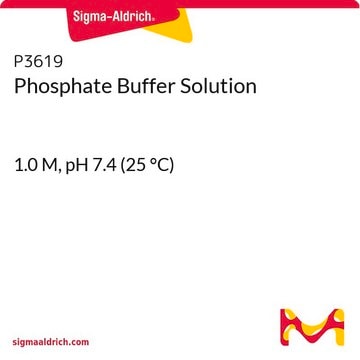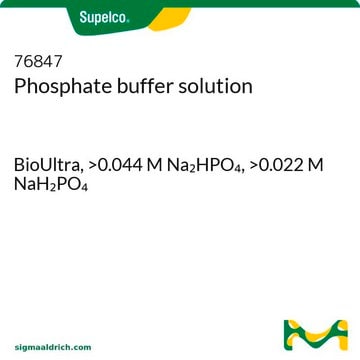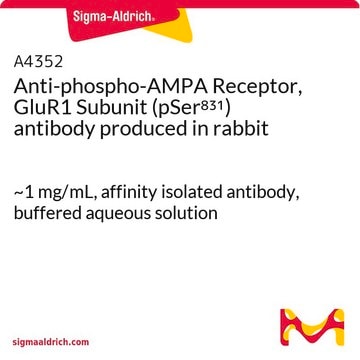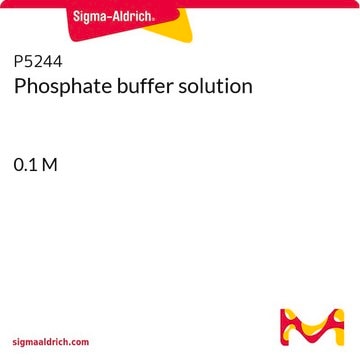MABN832
Anti-pan-AMPA receptor (GluR1-4), clone 2D8 Antibody
clone 2D8, from mouse
Synonyme(s) :
Glutamate receptor 1, GluR-1, AMPA-selective glutamate receptor 1, GluR-A, GluR-K1, Glutamate receptor ionotropic, AMPA 1, GluA1
About This Item
Produits recommandés
Source biologique
mouse
Niveau de qualité
Forme d'anticorps
purified antibody
Type de produit anticorps
primary antibodies
Clone
2D8, monoclonal
Espèces réactives
human, rat
Technique(s)
ELISA: suitable
electron microscopy: suitable
immunocytochemistry: suitable
immunofluorescence: suitable
immunohistochemistry: suitable
western blot: suitable
Isotype
IgG2bκ
Conditions d'expédition
wet ice
Modification post-traductionnelle de la cible
unmodified
Informations sur le gène
human ... GRIA1(2890)
Description générale
Immunogène
Application
Western Blotting Analysis: 1.0 µg/mL from a representative lot detected AMPA receptor (GluR1-4) in 10 µg of transfected human GluA1 HEK293, transfected rat GluA1 HEK293, transfected rat GluA2 HEK293, transfected rat GluA3 HEK293, and Mock transfected cell lysate.
Immunohistochemistry Analysis: A 1:250-1,000 dilution from a representative lot detected AMPA receptor (GluR1-4) in human cerebral cortex, human thalamus, rat cerebellum, and rat cerebral cortex tissue.
Immunocytochemistry Analysis: A representative lot detected AMPA receptor (GluR1-4) in Hela cells transfected with GluA1, GluA2, GluA3 and GluA4 (Courtesy of Dr John Morrison, Mount Sinai School of Medicine).
Immunofluorescence Analysis: A representative lot detected AMPA receptor (GluR1-4) in rodent, primate and human brain sections (Courtesy of Dr John Morrison, Mount Sinai School of Medicine).
Electron Microscopy Analysis: A representative lot detected AMPA receptor (GluR1-4) in rat hippocampus (Courtesy of Dr John Morrison, Mount Sinai School of Medicine).
ELISA Analysis: A representative lot detected AMPA receptor (GluR1-4) in TrpE fusion proteins (Courtesy of Dr John Morrison, Mount Sinai School of Medicine).
Qualité
Western Blotting Analysis: 0.5 µg/mL of this antibody detected AMPA receptor (GluR1-4) in 10 µg of rat brain tissue lysate.
Description de la cible
Forme physique
Autres remarques
Vous ne trouvez pas le bon produit ?
Essayez notre Outil de sélection de produits.
En option
Code de la classe de stockage
12 - Non Combustible Liquids
Classe de danger pour l'eau (WGK)
WGK 1
Point d'éclair (°F)
Not applicable
Point d'éclair (°C)
Not applicable
Certificats d'analyse (COA)
Recherchez un Certificats d'analyse (COA) en saisissant le numéro de lot du produit. Les numéros de lot figurent sur l'étiquette du produit après les mots "Lot" ou "Batch".
Déjà en possession de ce produit ?
Retrouvez la documentation relative aux produits que vous avez récemment achetés dans la Bibliothèque de documents.
Notre équipe de scientifiques dispose d'une expérience dans tous les secteurs de la recherche, notamment en sciences de la vie, science des matériaux, synthèse chimique, chromatographie, analyse et dans de nombreux autres domaines..
Contacter notre Service technique







